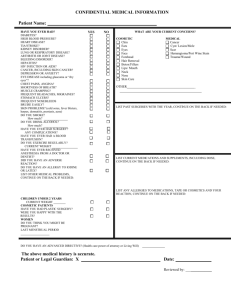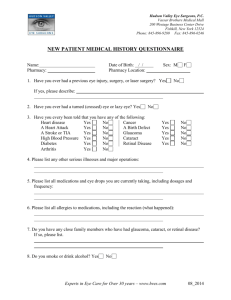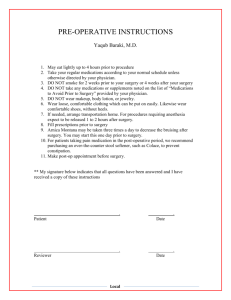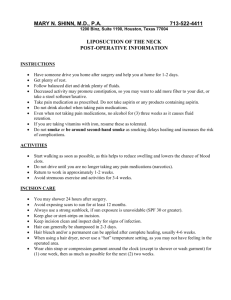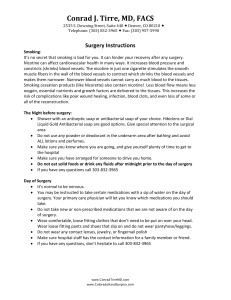May 2014 - University Family Medicine Center, PA
advertisement
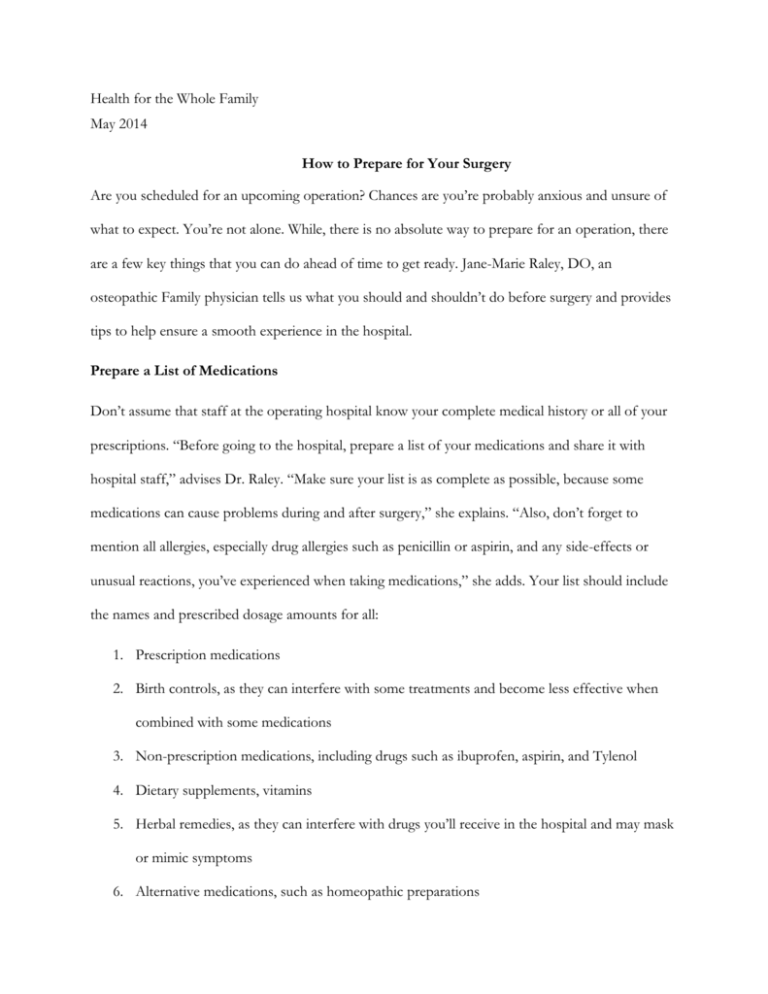
Health for the Whole Family May 2014 How to Prepare for Your Surgery Are you scheduled for an upcoming operation? Chances are you’re probably anxious and unsure of what to expect. You’re not alone. While, there is no absolute way to prepare for an operation, there are a few key things that you can do ahead of time to get ready. Jane-Marie Raley, DO, an osteopathic Family physician tells us what you should and shouldn’t do before surgery and provides tips to help ensure a smooth experience in the hospital. Prepare a List of Medications Don’t assume that staff at the operating hospital know your complete medical history or all of your prescriptions. “Before going to the hospital, prepare a list of your medications and share it with hospital staff,” advises Dr. Raley. “Make sure your list is as complete as possible, because some medications can cause problems during and after surgery,” she explains. “Also, don’t forget to mention all allergies, especially drug allergies such as penicillin or aspirin, and any side-effects or unusual reactions, you’ve experienced when taking medications,” she adds. Your list should include the names and prescribed dosage amounts for all: 1. Prescription medications 2. Birth controls, as they can interfere with some treatments and become less effective when combined with some medications 3. Non-prescription medications, including drugs such as ibuprofen, aspirin, and Tylenol 4. Dietary supplements, vitamins 5. Herbal remedies, as they can interfere with drugs you’ll receive in the hospital and may mask or mimic symptoms 6. Alternative medications, such as homeopathic preparations If you don’t have time to assemble all this information, Dr. Raley suggests putting all your pill bottles in a bag and bringing it with you to the hospital. She also warns against hiding habits from your surgeon. “Admit if you haven’t been following the prescribed dosage for your medications and tell your surgeon if you’ve cheated on your diet or are smoking,” she stresses. “It's your doctor’s job to help you get well; however they can’t do that without accurate and complete information from you.” Pack Only Essentials for Hospital Stay Since storage space at the hospital is generally very limited, Dr. Raley recommends bringing only the items you will need. If you’re staying in the hospital overnight, Dr. Raley suggests packing these items: ● Insurance and identification cards ● Toiletries, such as a toothbrush and toothpaste, comb/hairbrush, facecloth, soap and towel ● Pajamas/nightdress and slippers or soft shoes ● Any special items needed after surgery, such as hearing aid, cane, crutches, glasses etc. ● Clothes to wear when you go home (sweat-suit or something easy to put on and take off) ● A book, magazine, crosswords, etc. to pass the time ● A small amount of cash “Packing the right items can make your stay at the hospital a bit more comfortable and a little less stressful,” says Dr. Raley. Be Vocal in Your Treatment There are bound to be questions with any surgery. To help put your mind at ease, Dr. Raley recommends arranging time to see your surgeon several weeks before your scheduled procedure to discuss the surgery in-depth and to determine which lab tests and medications may be required before the surgery. “Don’t shy away from asking your surgeon questions about your procedure,” says Dr. Raley. “It’s essential that you learn about your operation and understand the purpose of it; and if you need clarification, don’t be afraid to ask your surgeon to draw you a picture,” she recommends. “Discussing all of your concerns with them will set the right tone for your operation and recovery.” From Surgery to Better Health Your surgery will have the best outcome if you are as healthy as possible when it begins. “If you feel ill or have a fever, call your surgeon to discuss postponing the surgery,” advises Dr. Raley. “Also, keep in mind that simple things, such as eating a well-balanced diet and quitting smoking will positively impact your body’s ability to recover,” she adds. “With good preparation and consultation, you’ll be well on your way to a successful surgery and better health.” Preventive medicine is just one aspect of care osteopathic physicians provide. DOs are fully licensed to prescribe medicine and practice in all specialty areas, including surgery. DOs are trained to consider the health of the whole person and use their hands to help diagnose and treat their patients.
